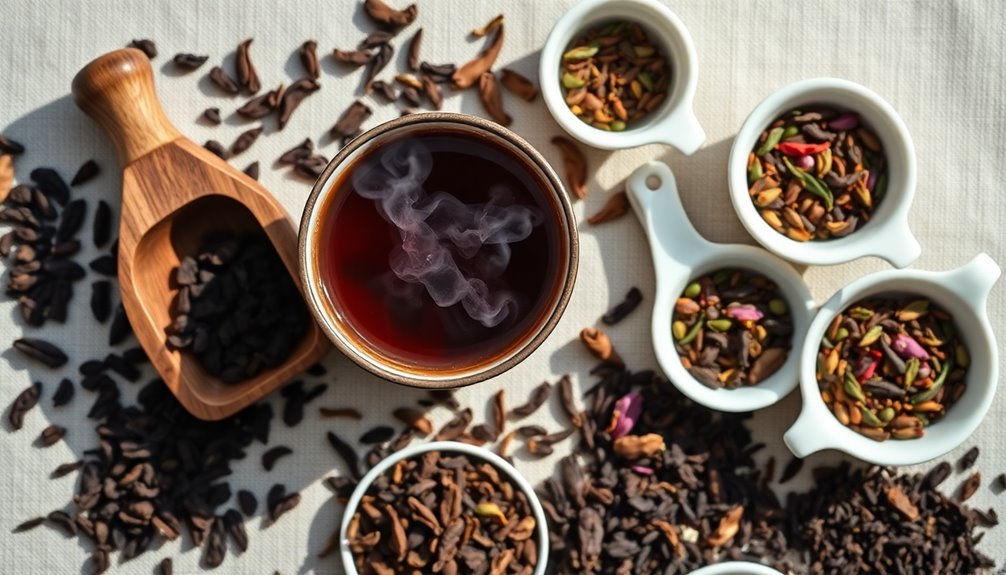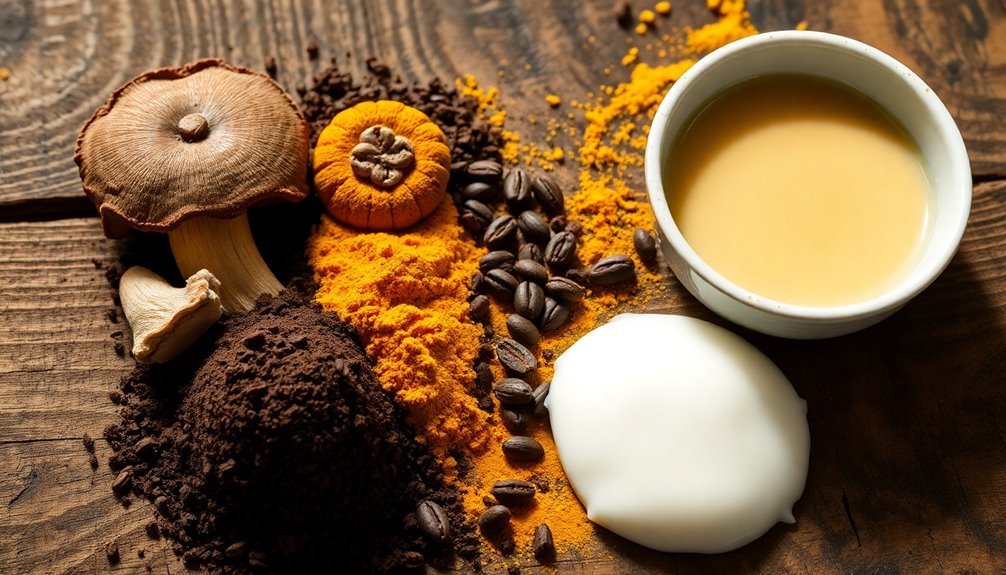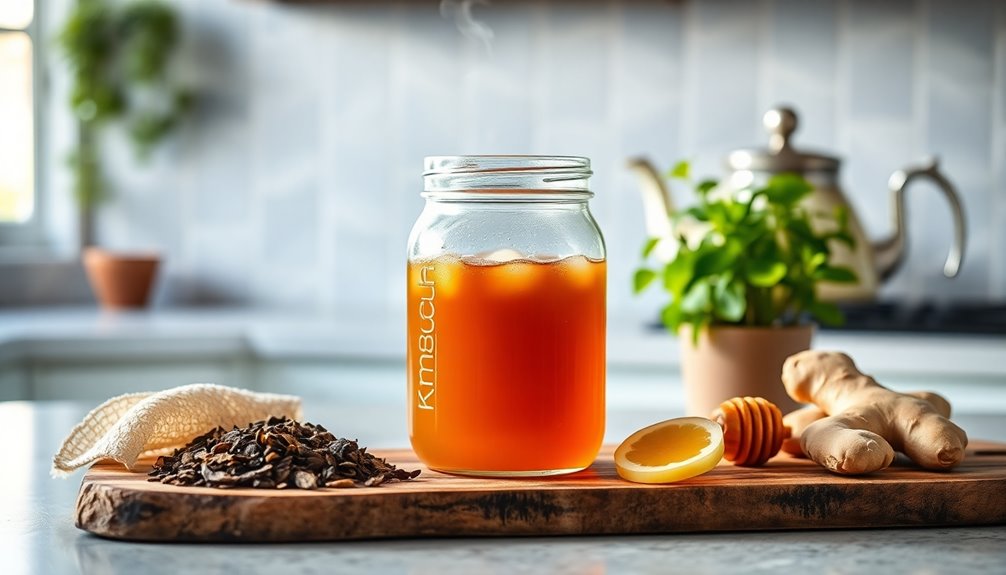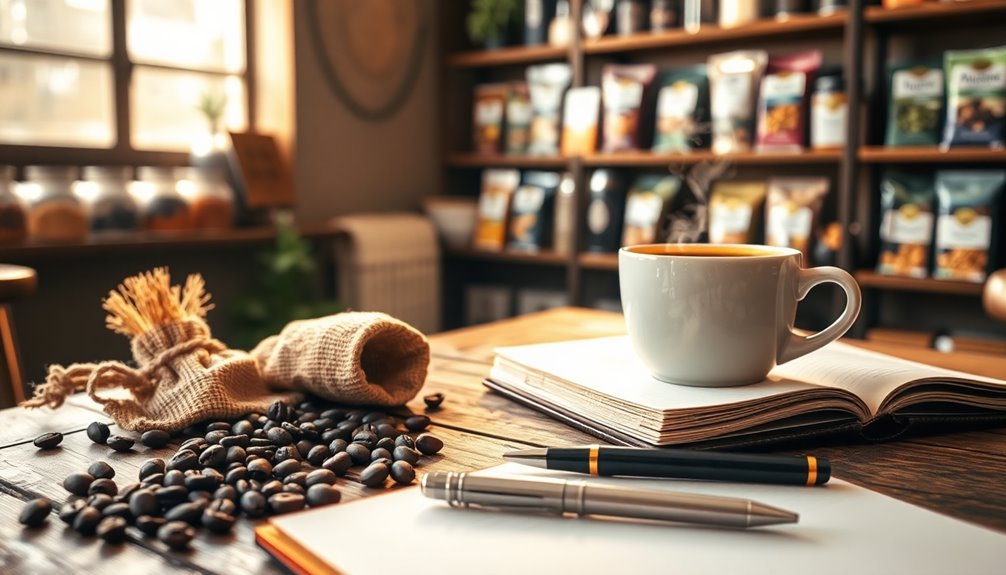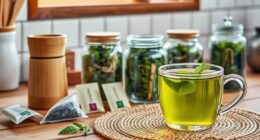If you're looking for teas that mimic coffee, you're in for a treat! Black tea and hojicha deliver robust flavors similar to coffee. For a caffeine-free option, try dandelion root tea, which supports digestion and offers an earthy taste. Rooibos and genmaicha also provide unique flavors and health benefits. If you prefer a sweet touch, carob tea can satisfy your cravings without caffeine. Loose leaf teas enhance the flavor profile, and experimenting with natural sweeteners can elevate your experience. There's plenty more to discover about these delightful alternatives, so stick around to learn all the exciting options available!
Key Takeaways
- Black tea and hojicha provide robust flavors that closely resemble coffee, making them excellent alternatives for a caffeine boost.
- Rooibos tea offers a naturally sweet and earthy flavor, while being caffeine-free and rich in antioxidants.
- Genmaicha combines green tea with roasted brown rice, delivering a toasty flavor profile reminiscent of coffee.
- Dandelion root tea, when roasted, offers an earthy taste and supports digestive health without caffeine.
- Carob tea mimics coffee's sweetness and chocolate notes, providing a soothing and caffeine-free beverage option.
Differences Between Coffee and Tea

When you compare coffee and tea, you'll notice some key differences that can affect your daily routine.
Coffee drinkers often rely on its 95 mg of caffeine per serving for a quick boost of energy. However, this can lead to sudden drops in energy levels and increased nervousness.
In contrast, tea offers a variety of caffeine levels, providing a more sustained energy effect throughout the day. Herbal teas like chamomile and peppermint come with health perks, promoting relaxation and reducing stress. Additionally, green and black teas contain moderate levels of caffeine, while white tea and oolong tea have lower amounts. One popular type of tea, chai, is made with a mixture of black tea and spices such as cinnamon, cardamom, and ginger. Many people wonder how much caffeine in chai tea, and the answer depends on the brewing method and the specific blend of ingredients used. Overall, tea offers a wide range of caffeine levels to suit individual preferences and needs.
Plus, teas such as green and white are rich in antioxidants and can hydrate better than coffee, which tends to dehydrate.
The distinct flavor profile and aroma of each beverage also contribute to their unique appeal and potential health benefits.
Best Tea Alternatives to Coffee

If you're looking to swap your morning coffee for something new, several tea options can satisfy your cravings.
Popular choices like black tea and hojicha offer similar robust flavors, while others like rooibos and genmaicha come with added health benefits.
Let's explore these alternatives and see how they can enhance your daily routine.
Popular Coffee-Flavored Teas
For those seeking a satisfying alternative to coffee, several teas deliver robust flavors and energizing properties without the jitters.
Here are some popular coffee-flavored teas you can enjoy:
- Black Tea: Varieties like Assam and Irish Breakfast offer a robust flavor and higher caffeine content for a more intense experience.
- Hojicha: This dark roasted stem tea mimics the earthy flavors of coffee and is naturally low in caffeine.
- Genmaicha: A unique blend of green tea and roasted rice, providing a nutty, cereal-like flavor while being low in caffeine.
- Dandelion Root Tea: Roasted for an earthy flavor, this caffeine-free tea also supports digestive health.
- Carob Tea: An herbal infusion with a sweet, coffee-like taste, perfect for a caffeine-free alternative.
Health Benefits of Alternatives
While many people turn to coffee for an energy boost, exploring tea alternatives can offer a wealth of health benefits without the jitters. These options are packed with antioxidants, support digestion, and provide a satisfying flavor. In addition, many tea alternatives can be incorporated into a low carb diet to help maintain energy levels while avoiding excess sugar.
| Tea Type | Health Benefits | Caffeine Content |
|---|---|---|
| Rooibos | Rich in antioxidants, anti-inflammatory | Caffeine-free |
| Chamomile | Aids digestion, promotes relaxation | Caffeine-free |
| Matcha | Boosts metabolism, calm energy | 70 mg per cup |
| Yerba Mate | Balanced energy boost, vitamins | 78-80 mg per cup |
| Chicory Coffee | Regulates blood sugar, prebiotic | Caffeine-free |
Embrace these herbal coffee substitutes for a healthier lifestyle that keeps you energized and nourished!
Caffeine Levels in Tea
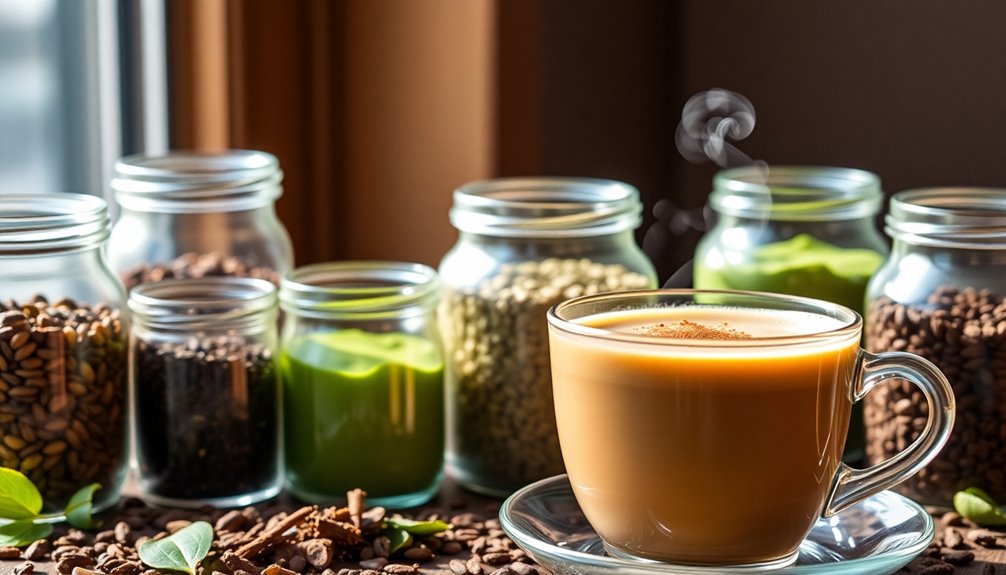
Understanding caffeine levels in tea is essential for anyone seeking a beverage that mimics coffee's stimulating effects.
Different teas offer varying caffeine content, making it easy to find your perfect alternative to coffee.
- Scottish Breakfast and Raspberry Black Tea: Medium to high caffeine levels for a stronger experience.
- Organic China Green Tea: Moderate caffeine content for a gentler energy boost.
- Imperial Matcha: High caffeine with L-theanine for cognitive benefits.
- Licorice Tea and Peppermint Tea: Caffeine-free options that are still flavorful.
- Japanese Green Tea and Tea Blends: Explore options with different caffeine levels to suit your preference.
With these choices, you can enjoy delicious teas while still getting the caffeine kick you crave. Additionally, incorporating keto breakfast ideas can complement your beverage choice for a balanced start to your day.
Preparing and Enjoying Tea

When you prepare tea, mastering the brewing techniques can make all the difference in flavor.
Using loose leaf tea often enhances the taste compared to bags, allowing the leaves to fully expand.
Don't forget to experiment with natural flavor enhancers to find your perfect cup! Additionally, using glass or ceramic vessels for brewing can help improve the overall taste experience.
Optimal Brewing Techniques
To brew the perfect cup of tea that mimics the rich flavors of coffee, you need to pay attention to steeping time and water temperature. Here are some ideal brewing techniques to get you started:
- Use boiling water for black tea and cooler water for green tea to enhance flavor profiles.
- Steep black tea for 3-5 minutes; follow package instructions for precise steeping time.
- Opt for loose leaf tea instead of tea bags for fresher, higher quality leaves.
- Generally, use 1 rounded teaspoon of loose leaf tea per 8oz cup.
- Consider natural sweeteners like honey to further enrich your tea.
- For an added layer of aroma, you might consider incorporating essential oils for aromatherapy to enhance your tea experience.
With these tips, you'll enjoy a robust tea that satisfies your coffee cravings!
Flavor Enhancements Tips
After mastering the ideal brewing techniques, you can take your tea experience a step further by enhancing its flavor.
Start with loose leaf teas for a rich flavor, as they offer fresher leaves than bags. Use 1 rounded teaspoon per 8oz of water and follow the steeping time indicated on the package—black teas typically need 3-5 minutes.
Experiment with water temperature; boiling water works best for black teas, while cooler temps preserve green teas' delicate flavors.
Natural sweeteners like honey or flavor enhancers such as lemon can elevate your tea's profile.
For a unique twist, try adding roasted barley or herbal infusions to create a coffee-like experience, making your tea both enjoyable and satisfying. Additionally, consider incorporating diversification in your beverage choices by exploring various tea types to enhance your palate and discover new favorites.
Loose Leaf vs. Bags
While both loose leaf and tea bags offer unique experiences, choosing the right one can elevate your tea enjoyment markedly.
Loose leaf teas often provide stronger flavor and higher quality, as whole leaves can fully expand during brewing, allowing for better extraction.
Here are some tips to enhance your brewing experience:
- Use about 1 rounded teaspoon of loose leaf per 8oz cup.
- Confirm proper steeping times and temperatures; black tea needs 3-5 minutes at boiling, while green tea requires lower temps for 2-3 minutes.
- Opt for a teapot with a filter or mesh infuser for prime flavor circulation.
- Explore various blends, as loose leaf options are often more customizable.
- Enjoy the freshness that loose leaf provides, favored by tea enthusiasts.
- Incorporating pleasant scents from essential oils during your tea time can further enhance relaxation and emotional well-being.
Health Considerations and Cultural Significance

As you explore the world of teas that mimic coffee, you'll find that their health benefits and cultural significance go hand in hand. Many teas, particularly green varieties, boast high antioxidant content, promoting overall health and reducing the risk of heart disease, highlighting their cardiovascular benefits.
Herbal teas, like dandelion and chamomile, support digestion and can lower blood pressure, making them flavorful alternatives to coffee. Additionally, tea's cultural significance is profound; in traditions like the Japanese tea ceremony, mindfulness and appreciation of the beverage are celebrated.
This rich history in traditional medicine showcases how specific blends are used for health benefits, such as ginger tea for digestion, further enhancing your tea experience. Moreover, similar to glycolic acid's effectiveness in improving skin texture, the benefits of tea extend to various aspects of health and wellness.
Key Ingredients and Their Benefits

Exploring teas that mimic coffee reveals a fascinating array of ingredients, each offering unique flavors and benefits.
These alternatives not only satisfy your coffee cravings but also provide health advantages. Here are some key ingredients to evaluate:
- Chicory Root: Caffeine-free with a caramelized flavor that supports digestive health.
- Dandelion Root: Roasted for an earthy flavor, it boasts potential digestive benefits.
- Toasted Barley: Adds nuttiness and chocolate hints, reminiscent of coffee.
- Carob: A soothing alternative that offers sweetness and cocoa aromas.
- Acorns: Roasted for a nutty, bittersweet profile closely resembling coffee.
Additionally, many of these ingredients are rich in antioxidants that combat oxidative stress, providing extra health benefits beyond their delightful flavors. These ingredients make for delightful, roasted brews that deliver rich tastes without the caffeine jitters!
Frequently Asked Questions
What Tea Is a Good Substitute for Coffee?
If you're looking for a good substitute for coffee, try Kuki Hojicha. Its dark roasted flavor offers hints of dark chocolate and black coffee that you'll love.
Chicory root tea is another great option, providing a warm, earthy taste without caffeine. Dandelion root tea also mimics coffee's robust flavor while being rich in nutrients.
For a unique twist, Genmaicha combines green tea with roasted rice, offering a nutty profile that's both satisfying and lower in caffeine.
Which Tea Tastes the Most Like Coffee?
If you're looking for a tea that tastes most like coffee, you might want to try Kuki Hojicha. Its dark roasted flavors evoke notes of dark chocolate and black coffee.
Alternatively, dandelion root tea, when roasted, delivers an earthy profile that closely resembles black coffee.
Chicory root tea is another great option, offering a warm, rich flavor that pairs well with breakfast.
Each of these teas can satisfy your coffee cravings while providing unique taste experiences.
Which Coffee Alternative Tastes the Most Like Coffee?
When you're looking for a coffee alternative that tastes the most like coffee, consider trying Kuki Hojicha. Its dark roasted flavor offers warm notes that remind you of dark chocolate and black coffee.
If you prefer something caffeine-free, chicory root tea is another great option, giving you that earthy flavor.
For a robust taste, roasted dandelion root tea could be your go-to, providing a similar depth without the caffeine buzz.
What Herbs Taste Like Coffee?
Imagine wandering through a lush forest, where the earthy scent of chicory root wafts through the air, inviting you to taste its rich, coffee-like flavor.
As you explore, dandelion root offers a robust bitterness, whispering tales of digestive health.
Carob joins the journey, sweetening your adventure, while roasted acorns add a nutty twist.
Finally, toasted barley wraps it all in warmth, creating a comforting cup that satisfies your coffee cravings without the caffeine.
Conclusion
As you explore the world of tea, think of it as a cozy blanket, wrapping you in warmth and comfort, just like your favorite cup of coffee. Each sip reveals a new layer of flavor and relaxation, inviting you to pause and savor the moment. By embracing these delightful alternatives, you not only nourish your body but also honor centuries of tradition. So, brew your tea, let its aromas dance around you, and enjoy the peaceful journey it offers.
